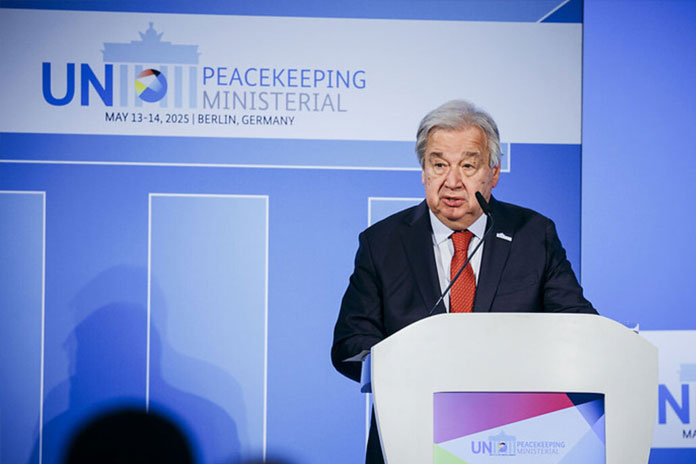A total of 74 United Nations Member States made formal pledges at the UN Peacekeeping Ministerial 2025 in Berlin today, including commitments for 88 military and police units, contributions towards technology and training, and €82 million in financial support from Germany.
The two-day meeting, hosted by the Government of Germany, saw participation from over 130 UN Member States and international partners. Over a thousand delegates attended the high-level session, which focused on strengthening peacekeeping operations through innovation, partnerships, and enhanced capability.
United Nations Secretary-General António Guterres said, “In trouble spots around the world, Blue Helmets can mean the difference between life and death. Now more than ever, the world needs the United Nations. And the United Nations needs peacekeeping that is fully equipped for today’s realities and tomorrow’s challenges.”
He added, “We welcome Member States’ political statements of support for peacekeeping as well as their pledges of military and police capabilities, new partnerships and technological support. This meeting is also about something more fundamental: the future of peacekeeping itself.”
Germany’s Minister of Foreign Affairs Johann Wadephul said, “In the past two days, more than 130 UN member states have come together in Berlin, determined to make progress towards this goal together. We all agree that setting up strong and effective peacekeeping missions is our joint responsibility. We want to tailor future missions to the exact needs of the host countries and increase their acceptance and effectiveness.”
Germany announced financial contributions worth €82 million. “Germany continues to be a steadfast supporter of UN Peacekeeping and has pledged contributions worth 82 million Euros. In addition, we will continue our support to missions and partners with training and equipment,” said Boris Pistorius, Minister of Defence of the Federal Republic of Germany.
Key outcomes of the Berlin Ministerial:
- Military and police units: 53 countries pledged uniformed capabilities, including 88 military and police units, airlift, individual experts, staff officers, and individual police officers.
- Specialised training: 59 countries pledged training initiatives on peacekeeping-intelligence, protection of civilians, gender, and the prevention of sexual exploitation and abuse.
- Technology and data: 18 Member States made pledges related to technological innovations and data-driven approaches to improve peacekeeping effectiveness.
- Women, peace and security: 38 countries pledged support for gender-responsive operations and the inclusion of women in peacekeeping roles.
- Safety and security: 16 Member States pledged resources to improve peacekeeper safety.
- Conduct and accountability: 11 Member States pledged support towards ethical conduct and accountability, including contributions to the Trust Fund for victims.
- Strategic communications: Eight Member States committed resources to strengthen information integrity and communications.
The Berlin meeting is part of a series of Peacekeeping Ministerials, following previous sessions in Accra (2023), Seoul (2021), New York (2019), Vancouver (2017), and London (2016). The 2025 Ministerial coincides with the 80th anniversary of the United Nations and the 10-year anniversary of the Leaders’ Summit on Peacekeeping.
Currently, over 61,000 uniformed personnel from 119 countries and more than 7,000 civilian staff serve across 11 UN Peacekeeping Missions.










